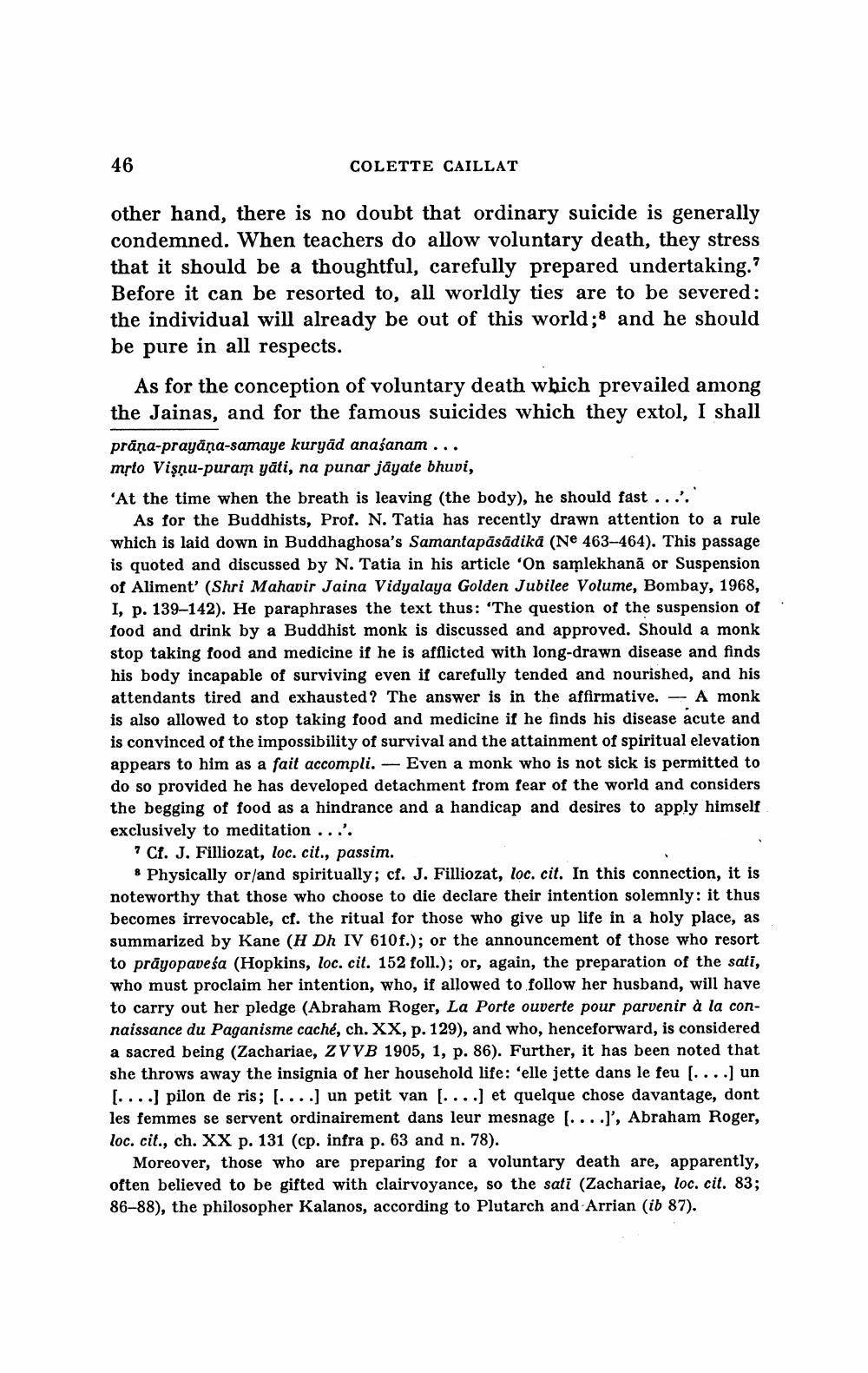Book Title: Fasting Unto Death According To Jaina Tradition Author(s): Colette Caillat Publisher: Colette Caillat View full book textPage 4
________________ 46 COLETTE CAILLAT other hand, there is no doubt that ordinary suicide is generally condemned. When teachers do allow voluntary death, they stress that it should be a thoughtful, carefully prepared undertaking." Before it can be resorted to, all worldly ties are to be severed: the individual will already be out of this world; and he should be pure in all respects. As for the conception of voluntary death which prevailed among the Jainas, and for the famous suicides which they extol, I shall prāṇa-prayāṇa-samaye kuryad anaśanam... mrto Vişņu-puram yati, na punar jayate bhuvi, 'At the time when the breath is leaving (the body), he should fast.... As for the Buddhists, Prof. N. Tatia has recently drawn attention to a rule which is laid down in Buddhaghosa's Samantapāsādikā (Ne 463-464). This passage is quoted and discussed by N. Tatia in his article 'On samlekhana or Suspension of Aliment' (Shri Mahavir Jaina Vidyalaya Golden Jubilee Volume, Bombay, 1968, I, p. 139-142). He paraphrases the text thus: "The question of the suspension of food and drink by a Buddhist monk is discussed and approved. Should a monk stop taking food and medicine if he is afflicted with long-drawn disease and finds his body incapable of surviving even if carefully tended and nourished, and his attendants tired and exhausted? The answer is in the affirmative. A monk is also allowed to stop taking food and medicine if he finds his disease acute and is convinced of the impossibility of survival and the attainment of spiritual elevation appears to him as a fait accompli. Even a monk who is not sick is permitted to do so provided he has developed detachment from fear of the world and considers the begging of food as a hindrance and a handicap and desires to apply himself exclusively to meditation.... 7 Cf. J. Filliozat, loc. cit., passim. Physically or/and spiritually; cf. J. Filliozat, loc. cit. In this connection, it is noteworthy that those who choose to die declare their intention solemnly: it thus becomes irrevocable, cf. the ritual for those who give up life in a holy place, as summarized by Kane (H Dh IV 610f.); or the announcement of those who resort to prayopavesa (Hopkins, loc. cit. 152 foll.); or, again, the preparation of the sati, who must proclaim her intention, who, if allowed to follow her husband, will have to carry out her pledge (Abraham Roger, La Porte ouverte pour parvenir à la connaissance du Paganisme caché, ch. XX, p. 129), and who, henceforward, is considered a sacred being (Zachariae, ZVVB 1905, 1, p. 86). Further, it has been noted that she throws away the insignia of her household life: 'elle jette dans le feu [....] un [....] pilon de ris; [....] un petit van [....] et quelque chose davantage, dont les femmes se servent ordinairement dans leur mesnage [....]', Abraham Roger, loc. cit., ch. XX p. 131 (cp. infra p. 63 and n. 78). Moreover, those who are preparing for a voluntary death are, apparently, often believed to be gifted with clairvoyance, so the sati (Zachariae, loc. cit. 83; 86-88), the philosopher Kalanos, according to Plutarch and Arrian (ib 87).Page Navigation
1 2 3 4 5 6 7 8 9 10 11 12 13 14 15 16 17 18 19 20 21 22 23 24
